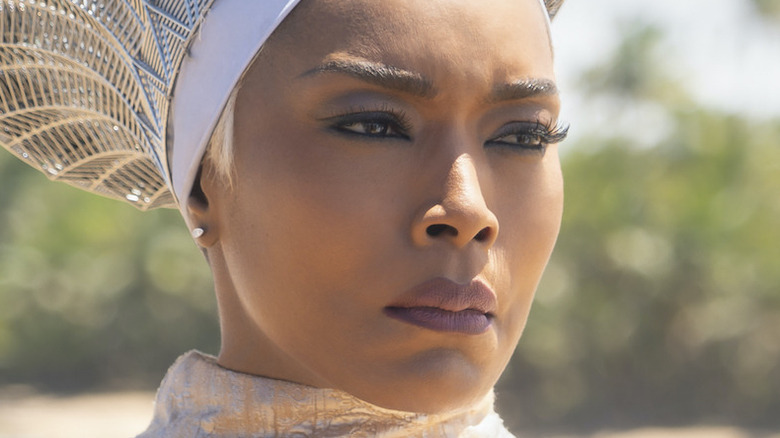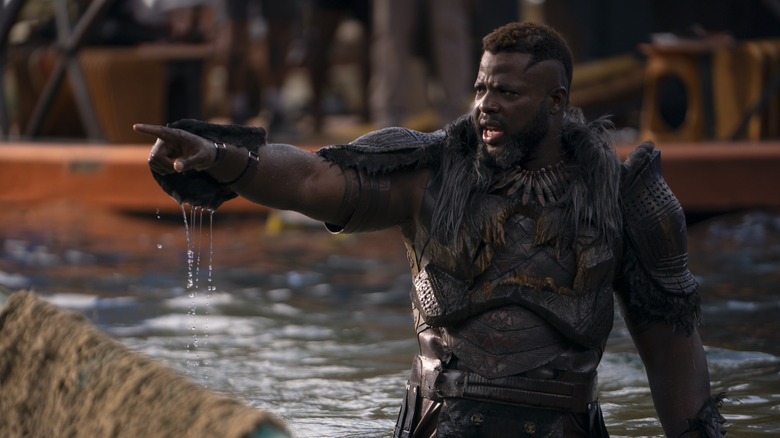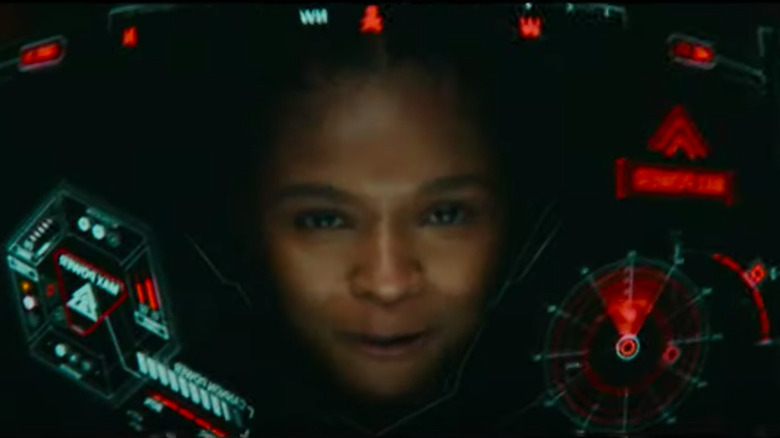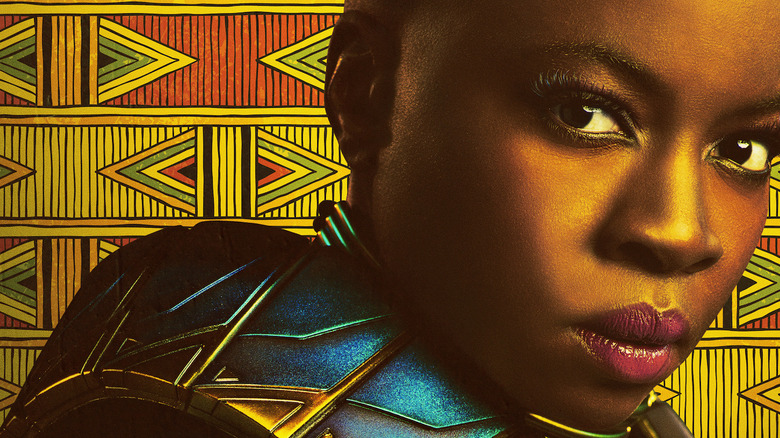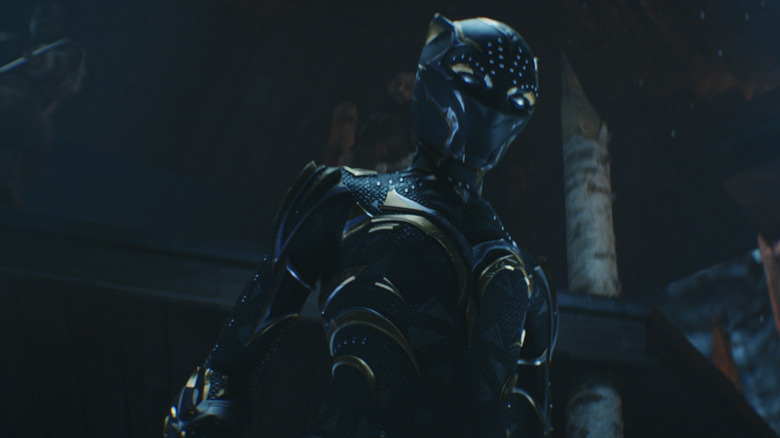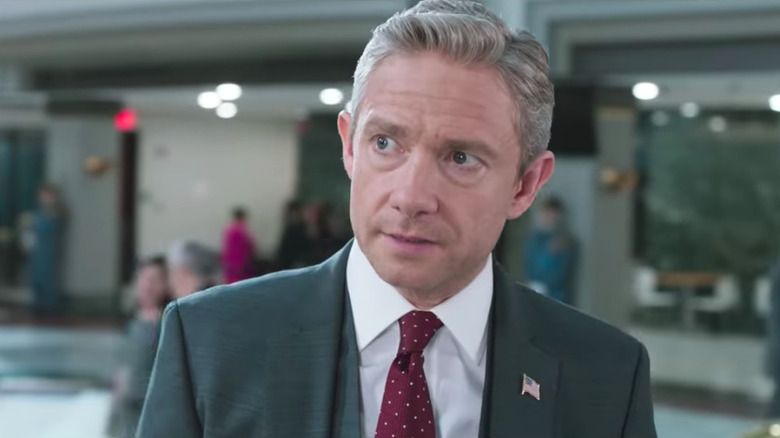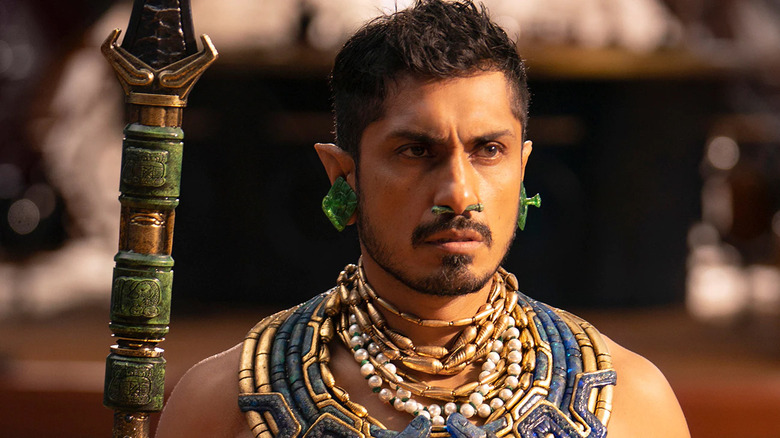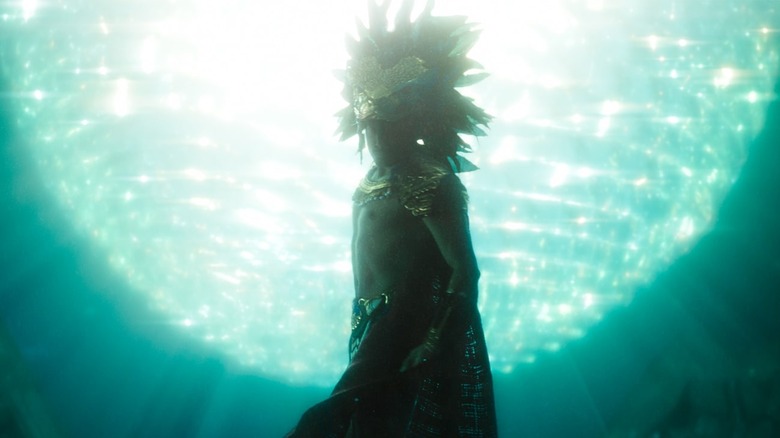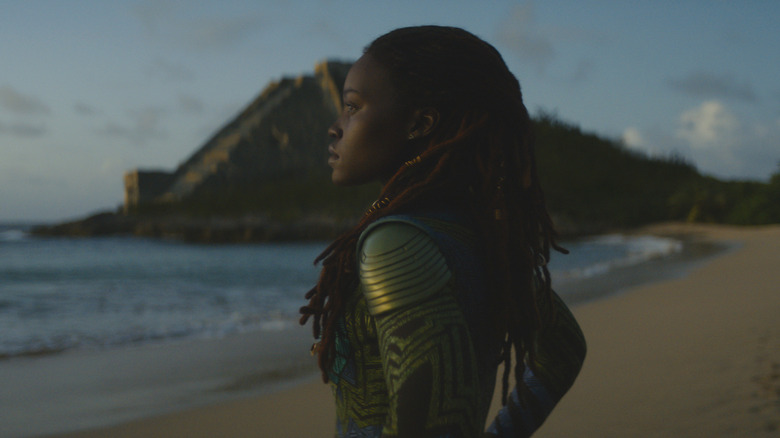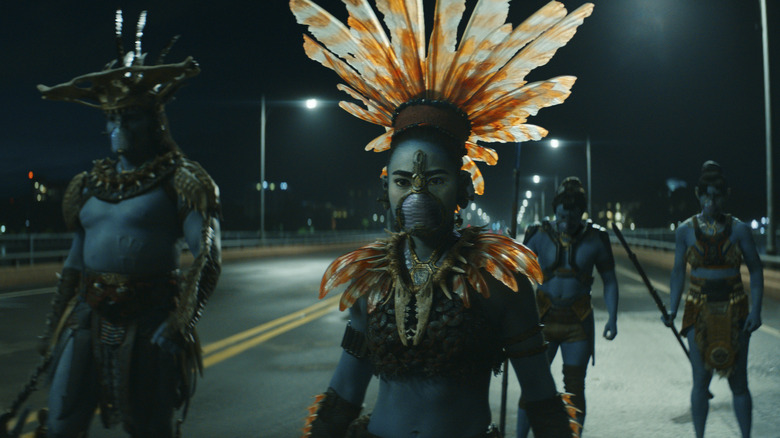Biggest Unanswered Questions In Black Panther: Wakanda Forever
This article contains major spoilers for "Black Panther: Wakanda Forever."
The technologically advanced African nation of Wakanda made its debut in 2018's "Black Panther." That movie follows the titular Black Panther, King T'Challa (Chadwick Boseman), as he grows into his role as the country's new leader, learns from his predecessors' mistakes, and opens Wakanda to the world. In the process, he reveals that Wakanda is the only place on Earth that possesses vibranium, a substance used to create everything from Black Panther's superhero suit to Captain America's shield.
The sequel, "Black Panther: Wakanda Forever," takes a dark turn. The characters fans know and love are laid low by their young king's untimely passing. As if that weren't enough, T'Challa's decision to open Wakanda to the world comes back to haunt the vibrant nation. Other countries' desire to possess vibranium starts an international race, which results in the emergence of the antiheroic King Namor (Tenoch Huerta), ruler of the underwater city of Talokan. While Wakanda and Talokan have a lot in common, including their deposits of the valuable metal, they find themselves at odds over how to handle the world's interest in vibranium. Namor, Queen Ramonda (Angela Bassett), and Princess Shuri (Letitia Wright) all want what's best for their people, but figuring out what that means is anything but simple.
"Black Panther: Wakanda Forever" tells a dense story full of surprising plot details, thrilling action, and emotional moments. But even this spectacular movie leaves some loose threads behind. From uncertainties regarding Shuri's future to the mystery of Namor's long-term plans, these are the biggest unanswered questions in "Black Panther: Wakanda Forever."
Who's going to become leader of Wakanda?
After King T'Chaka (John Kani) dies in "Captain America: Civil War," T'Challa becomes Wakanda's leader. In order to make his position official, T'Challa goes through a ceremony involving ritual combat. But when T'Challa dies, Ramonda becomes the country's leader, apparently by default. Shuri, the only other royal in Wakanda, seems fine with this situation, as she prefers to spend her time in her lab. But then Ramonda abruptly dies due to Namor's actions, making Shuri Wakanda's de facto leader. This development is overshadowed by the fact that Shuri also becomes the Black Panther shortly afterwards. It is this superheroic title she invokes to declare war on Namor and his people.
In one of the final scenes of "Black Panther: Wakanda Forever," the ceremony that solidified T'Challa's leadership is staged once more, seemingly indicating that Shuri is ready to officially become queen. But it's M'Baku (Winston Duke), not Shuri, who emerges to take part in the ritual. Fans know that M'Baku has coveted the throne since the first "Black Panther" film, in which he challenges T'Challa and loses. But in this case, there's no one there to challenge. Does that mean M'Baku gets the throne by default? While Shuri deliberately skips the ceremony, it's not clear if she sent M'Baku in her place with the intention of making him king. It's certainly possible: Shuri's never seemed all that interested in leadership, and she might feel that M'Baku is a better choice for the role. But ultimately, the question of who will be the country's new leader is left open.
What's next for Riri Williams?
One of the biggest developments in "Black Panther: Wakanda Forever" is the introduction of Riri Williams (Dominique Thorne), a genius MIT student and the inventor of the vibranium detection device that the United States uses to search for the valuable metal. This invention puts her squarely in Namor's crosshairs. Shuri and Okoye travel to America to protect Riri, and soon learn she's created an Iron Man-style suit in her garage. When she joins the fight against Namor and the Talokans, it's mainly to repay her debt to Wakanda — especially Ramonda — for saving her life.
Being a superhero long-term doesn't seem to be part of Riri's plans, and by the end of the movie, she's on her way back to MIT. This surely isn't the last we'll see of her, though. For one thing, she's the star of the upcoming "Ironheart" Disney+ series, which indicates she'll take up that superheroic moniker and become an official do-gooder. Plus, she's one of many young superheroes introduced in the Marvel Cinematic Universe's Phase 4, including America Chavez (Xochitl Gomez), Ms. Marvel (Iman Vellani), and Kate Bishop (Hailee Steinfeld). Riri seems poised to team up with them as part of a Young Avengers-style group somewhere down the line.
What's next for Okoye now that she's a Midnight Angel?
Okoye has a life-altering storyline in "Black Panther: Wakanda Forever." Not only is she devastated by T'Challa's death, a frantic Ramonda, who blames her for losing Shuri to Namor and the Talokans in Boston, fires her from the Dora Milaje. It seems like Okoye does her best to leave her former life behind; when Ramonda dies and Shuri comes to enlist her in the fight against the Talokans, Okoye initially seems reluctant. Fortunately, Shuri has an added incentive: a suit she refers to as the Midnight Angel.
Throughout the film, Shuri tries to get Okoye to accept upgrades to the Dora Milaje's armor and weapons, with no real luck. But things change when Okoye sees Shuri's Midnight Angel prototype. She, along with Ayo (Florence Kasumba) and Aneka (Michaela Coel), wear the new suits during the movie's climactic final battle. Not only does this allow Okoye to jump back into action, it also means she's part of a new elite fighting unit.
Comic book fans will recognize the Midnight Angels as a strike force within the Dora Milaje. In their very first outing, they take on the infamous Dr. Doom after he steals Wakanda's vibranium. Could this mean that Okoye and the Midnight Angels will be the vehicle through which the Fantastic Four antagonist is introduced to the MCU? Possibly. Here's what we do know: The last we see of Okoye in "Black Panther: Wakanda Forever," she's rescuing Agent Everett Ross (Martin Freeman) from CIA custody entirely solo, likely at Shuri's request. One way or another, Okoye is once again an important player in Wakanda's affairs, and could become a more visible figure in the larger MCU.
Could there be multiple Black Panthers?
In "Black Panther," Killmonger (Michael B. Jordan) burns all of the heart-shaped herbs that empower the Black Panther, in an effort to prevent anyone else from gaining its impressive gifts. Shuri spends most of "Black Panther: Wakanda Forever" attempting to genetically engineer a new version of the herb, and endures repeated failures. But then, she uses a leaf that is part of a gift from Namor, which turns out to have similar properties as the heart-shaped herb. Shuri discovers how to reconstitute the herb, thanks to this addition, and hastily ingests it, making her the new Black Panther. By the end of the film, Wakandans are planting the newly reborn heart-shaped herb, ensuring they have a supply for future Wakandan protectors.
In many ways, Shuri's decision to become the Black Panther makes sense, based on Wakanda's history. She's the nation's current leader, and the leader and Black Panther are often the same person. Plus, Shuri has repeatedly proven herself a capable fighter when the need arises. However, by the end of the film, her desire to stay on the Wakandan throne is in question. Shuri's greatest skill remains her scientific genius, and the stunning technological advances it enables her to create. So while there's usually only one Black Panther at a time, after the events of "Black Panther: Wakanda Forever," there's a reasonable argument to be made that there should be an additional Black Panther, who can focus on the day-to-day protection of the nation. If M'Baku becomes Wakanda's king, he might insist on such a split.
What does Ross' arrest and rescue signal for the future?
CIA agent Everett Ross is drawn into the plot of "Black Panther: Wakanda Forever" when Okoye and Shuri travel to America and approach him for the name of the individual who created the vibranium-detecting device. While Ross is reluctant to share the information, he eventually relents, out of his ongoing loyalty to the Wakandans. Still, by giving up the name, he commits a crime against the United States. Unfortunately for him, it's only a matter of time before the CIA director discovers his treachery. The fact that the CIA director happens to be Valentina Allegra de Fontaine (Julia Louis-Dreyfus), the woman who's been pulling strings behind the scenes with people like John Walker, aka U.S. Agent (Wade Russell), and Yelena Belova (Florence Pugh) — not to mention the shocking revelation that she used to be married to Agent Ross — brings up all sorts of questions about what Val's endgame is and how Ross could play a part in it.
Val's decision to have Ross arrested and taken into custody is actually pretty by-the-books, given what he does. Whether she feels this gives her an advantage in her shadowy plans or she just wants to make Ross pay for sharing American secrets because she's a good CIA director isn't clear. Either way, though, with Ross now free and likely in Wakanda after being rescued by Okoye, it's natural to wonder if this could set up a showdown between Val and the Wakandans, with Ross in a key role. Ross doesn't seem to especially like Val, but there is a certain familiarity there that could be useful, if and when she stirs up trouble in the future. That could happen in the upcoming "Thunderbolts" movie, or another production altogether.
What are Namor's plans for Wakanda and the rest of the world?
The introduction of Namor is a big deal for both the world of the "Black Panther" movies and the MCU as a whole, especially since he's the rare Marvel antagonist who survives the conclusion of the film. In fact, he ends up agreeing to a truce between Wakanda and Talokan, bringing the fight between the two countries to an end. However, the Talokans are incredibly antagonistic to Wakanda and the rest of the world throughout the film: They first kill everyone in the American research facility searching for vibranium in the ocean depths, and later attack Wakanda after Nakia (Lupita Nyong'o) kills a Talokan while rescuing Shuri and Riri.
Throughout the movie, Namor rails against the evils of the surface world. He wants to keep Talokan hidden from those who dwell on land, and seems prepared to kill anyone who could compromise that objective. It seems his people agree with this stance, to the point that the truce with Wakanda frustrates at least some of them. Yet, when Namora (Mabel Cadena) confronts him about his decision to walk away peacefully, Namor ominously claims that when the surface world comes for Wakanda, Wakanda will turn to Talokan.
Namor seems to think that Wakanda's resources will be too much for the world to resist, eventually leading to a massive war only the Talokans can help them fight. At that point, the Talokans will have the opportunity to bring the surface world to its knees, as they originally planned. However, it's hard to imagine the whole world openly taking on Wakanda, or that Wakanda would need Talokan's help against far less technologically advanced countries. On the other hand, it's undeniable that the world is preoccupied with finding vibranium. Namor might very well have a point.
What does Namor's reference to himself as a mutant mean for the X-Men?
Fans who are eagerly awaiting the appearance of the X-Men in the MCU are likely to cheer when Namor refers to himself as a mutant in "Black Panther: Wakanda Forever." As the comics often describe him as the first mutant, his emergence as the MCU's first official member of that group creates a wonderful symmetry. While there have been hints about the existence of mutants in the MCU before, most prominently in the Disney+ series "Ms. Marvel," Namor is the first to identify himself this way. Morevoer, based on the origins he shares with his underwater kingdom, he's been around for a very long time.
Namor's introduction suggests there could be many other mutants in the MCU just waiting to be revealed. No plans have yet been announced for an official MCU "X-Men" film, but we know Logan, aka the mutant hero Wolverine, will be part of "Deadpool 3," the MCU's first "Deadpool" movie. What could this mean? Just like the MCU has been introducing many possible members of a Young Avengers-style super-team, so too could the MCU be introducing mutant characters with the goal of eventually bringing them together in an X-Men-esque group. Namor could also play an important role in a variety of other outings, including the MCU's upcoming "Fantastic Four" film.
What does the introduction of Nakia's son mean for the MCU long-term?
The mid-credits scene of "Black Panther: Wakanda Forever" introduces the character of Toussaint (Divine Love Konadu-Sun), son of Nakia and T'Challa, who reveals his real name is T'Challa Jr. Nakia has kept her child a secret from the Wakandan people at T'Challa's request. However, if the country's line of succession runs through the king, then T'Challa Jr. is the rightful heir to the throne. Shuri seems surprised but happy to meet her nephew. It's possible her reaction is the result of relief that there is someone else who could ultimately be responsible for leading Wakanda. Obviously, T'Challa Jr. is far too young to take on the duties of a king right now, but either Shuri or Nakia could act as his regent until he's ready to fulfill his role. Moreover, T'Challa Jr. could also become the Black Panther when he's old enough.
While Nakia seems to want to keep her son in Haiti for the time being, she indicates her plan is to bring him to Wakanda eventually. The question is, when will that happen? Even more pressingly, what will it mean for the future of Wakanda and the MCU as a whole? It's possible we won't hear about T'Challa Jr. again until the MCU's reached Phase 15 or so — assuming the franchise is still going. At that far-off point, T'Challa Jr. could become the leader his father intended to become before his untimely death. But the young boy also has the potential to cause an enormous shake-up in the Wakandan power structure. The MCU tends to be pretty calculated in its revelations, so we're betting that we'll see more of T'Challa Jr. sooner rather than later.
How did the Talokans become such good fighters on land?
This may not be the most pressing question in "Black Panther: Wakanda Forever," but it's definitely worth asking. Throughout the film, the Talokans repeatedly prove themselves to be not only exceptional fighters in the ocean, but also exceptional fighters on land, even though they can't breathe air. This is made especially clear during Okoye's fierce battle with Attuma (Alex Livinalli) on the bridge in Boston. Generally speaking, the Dora Milaje wipes the floor with all kinds of adversaries, including super-soldiers. However, Attuma's victory over Okoye is shockingly decisive. Although she bests him in a rematch later on in the film, the Talokans' incredible skill is very firmly established.
Namor's fighting abilities can be chalked up to his amphibious mutant status, but this isn't the case with his blue-skinned people. So how did the Talokans manage to become such good fighters on dry land? Is there a training facility on the surface they've secretly been using? Is there a dry chamber in Talokan where they're taught these skills from their earliest years? If this is the case, why? After all, this is a people who have managed to stay hidden from the surface world for centuries. Why are they so well prepared to take land-dwellers on if there's been no need to do so for generations? The end of "Black Panther: Wakanda Forever" implies we'll be seeing a lot more of Namor and the Talokans in future MCU projects. Perhaps this means we'll get some answers as to how they acquire their mysterious fighting abilities. Inquiring minds want to know!
